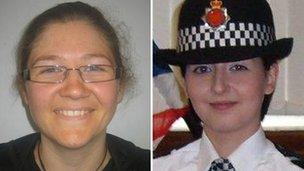The police are the public and vice versa
- Published
- comments
Police killed in attack in Mottram, Greater Manchester
One can see it etched on the faces of young bobbies just beyond the fluttering tape which marks the edge of the crime scene. The murder of two of their friends and colleagues has left them in deep shock and grief.
There is anger in their eyes too, but they know above all they must remain professional. Greater Manchester Police find themselves in the role of both crime investigators and crime victims.
The killing of policemen and women in the line of duty is mercifully rare on mainland Britain. A total of 76 officers have lost their lives since 1945, each one a tragedy but a roll of honour that reminds us these crimes are notable for their unexpectedness.
Indeed, before we consider how society might respond to the deaths in Manchester's Tameside district on Tuesday, it is probably worth reminding ourselves that homicide (murders and manslaughter cases) are at their lowest level for almost 30 years. Gun crime has been falling steadily for a decade - in 2011-12 there were 39 fatal shootings, 20 fewer than the previous year.

Police believe PCs Fiona Bone and Nicola Hughes were deliberately "drawn" to the scene
What emerges from the police briefings and local chatter is that decent communities on the outskirts of Manchester have been infected by the toxic morality of organised criminal gangs. It is a cancer that senior officers admit is hard to destroy because the law-abiding are frightened to co-operate.
Even a substantial £50,000 reward for information leading to the capture of Dale Cregan did not loosen tongues. People must have known where he was - he is a well-known and distinctive character - but in the end he gave himself up to police on Tuesday.
Indeed, there is evidence that Cregan enjoyed some popularity on the estates where he operated. In the warped world of gangland politics, the issue can be less about what is right and wrong and more a simple case of "whose side are you on?"
In thinking about how to break down what was described as a "conspiracy of silence", the Chief Constable of Great Manchester Police Sir Peter Fahy has told me that key is the question of legitimacy. Only if people in his city believe that the officers on patrol share the values of the communities they serve can one ever expect to break the omerta - Italian for code of silence - his detectives encounter.
He has spoken of his concern that, far from wanting to be armed, neighbourhood constables might consider whether the body armour they routinely wear risks setting them apart. Sometimes it is vital - a true life-saver. But Sir Peter once told me how he had seen bobbies among the T-shirted crowds of a summer community fete looking more like Robocop than Dixon of Dock Green.
There is a balance to be struck between minimising the risk to officers' safety and damaging the relationship between the police and the public they serve.
When GMP moved into their new glass-fronted headquarters recently, Sir Peter asked that the principles of Sir Robert Peel be written on the windows in letters that can be read 50m away. Perhaps the most important is the notion that the police are the public and the public are the police.
It is that, Sir Peter tells his officers, which gives the police the legitimacy they require. If the consequence of Tuesday's double murder is a display of militaristic toughness, the troubled inner-city estates may become even more difficult to police.